Cradle
Protein engineering without the guesswork
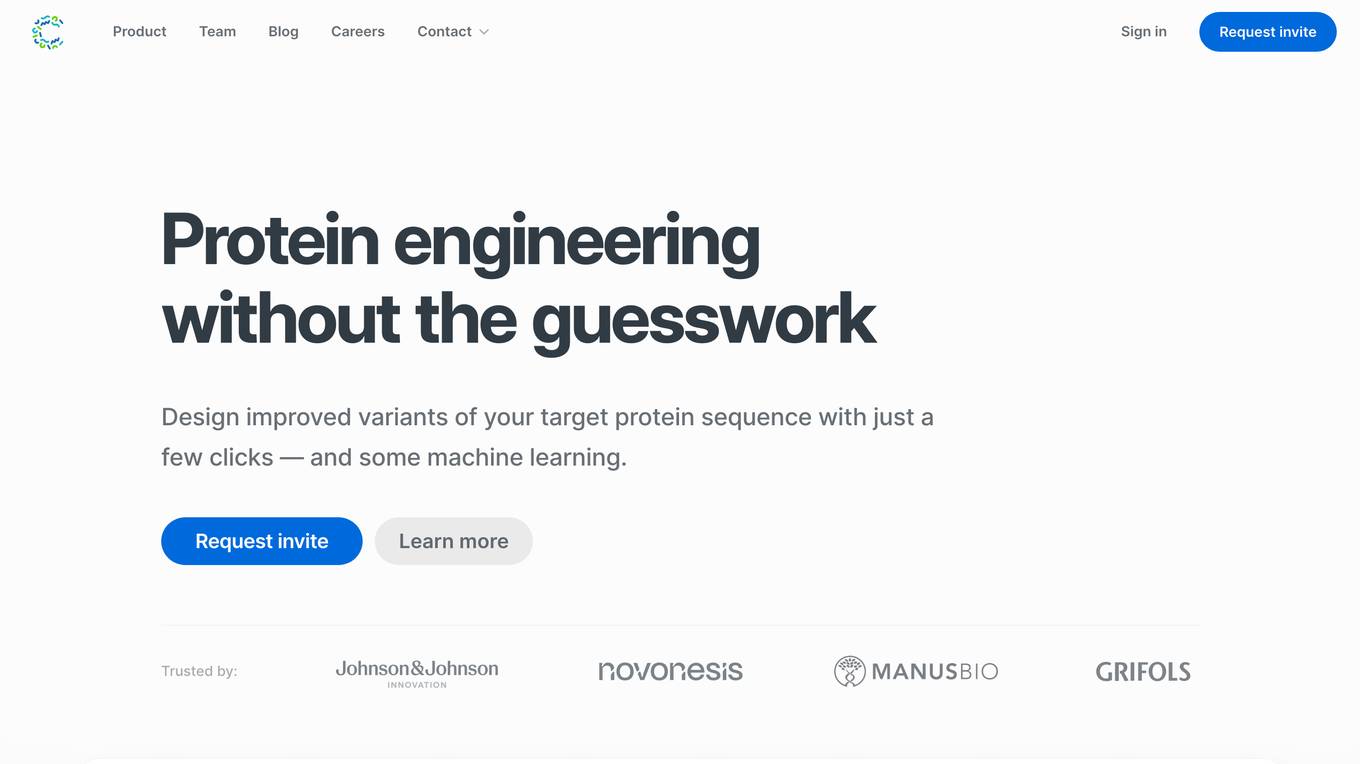
Cradle is a protein engineering platform that uses machine learning to design improved protein sequences. It allows users to import assay data, generate new sequences, test them in the lab, and import the results to improve the model. Cradle can be used to optimize multiple properties of a protein simultaneously, and it has been used by leading biotech teams to accelerate new and ongoing projects.
For Tasks:
Click tags to check more tools for each tasksFor Jobs:
Features
Advantages
Disadvantages
Frequently Asked Questions
Alternative AI tools for Cradle
Similar sites

Cradle
Cradle is a protein engineering platform that uses machine learning to design improved protein sequences. It allows users to import assay data, generate new sequences, test them in the lab, and import the results to improve the model. Cradle can be used to optimize multiple properties of a protein simultaneously, and it has been used by leading biotech teams to accelerate new and ongoing projects.
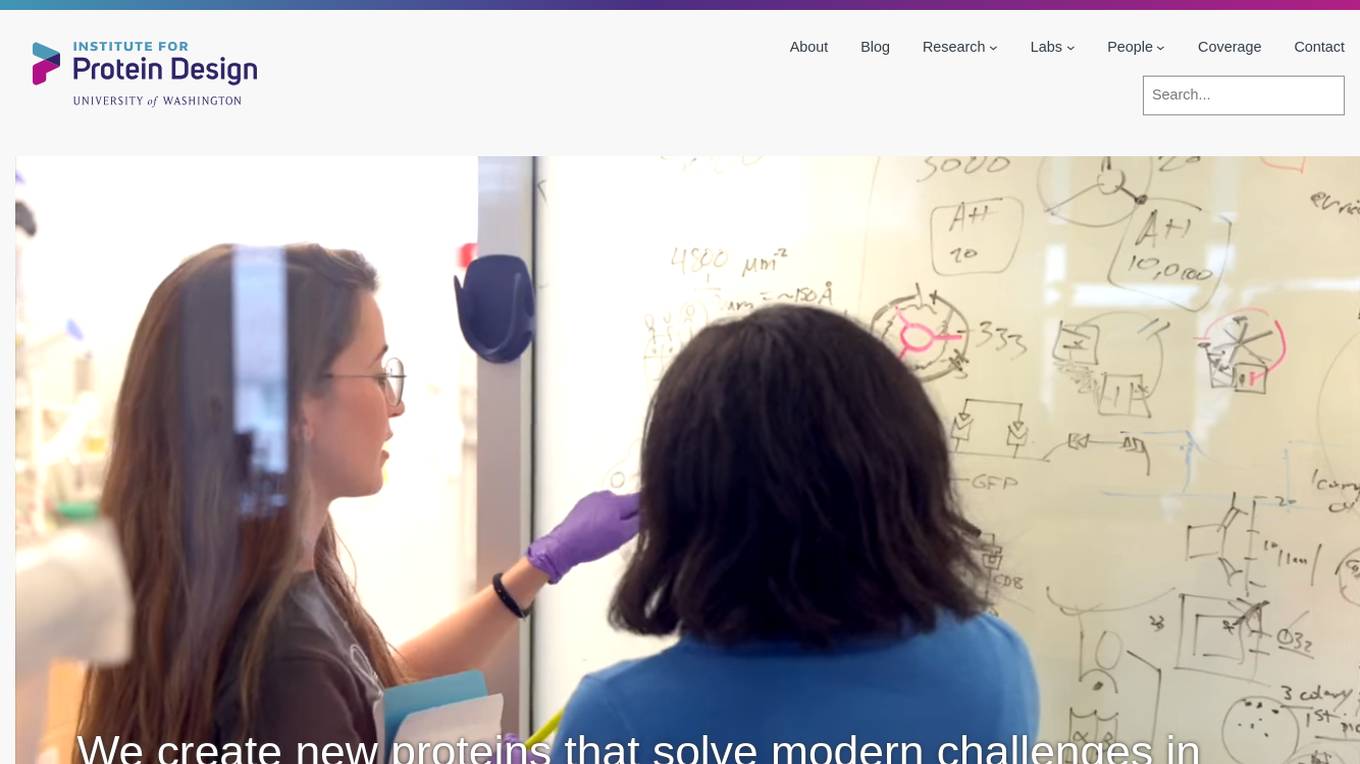
Institute for Protein Design
The Institute for Protein Design is a research institute at the University of Washington that uses computational design to create new proteins that solve modern challenges in medicine, technology, and sustainability. The institute's research focuses on developing new protein therapeutics, vaccines, drug delivery systems, biological devices, self-assembling nanomaterials, and bioactive peptides. The institute also has a strong commitment to responsible AI development and has developed a set of principles to guide its use of AI in research.
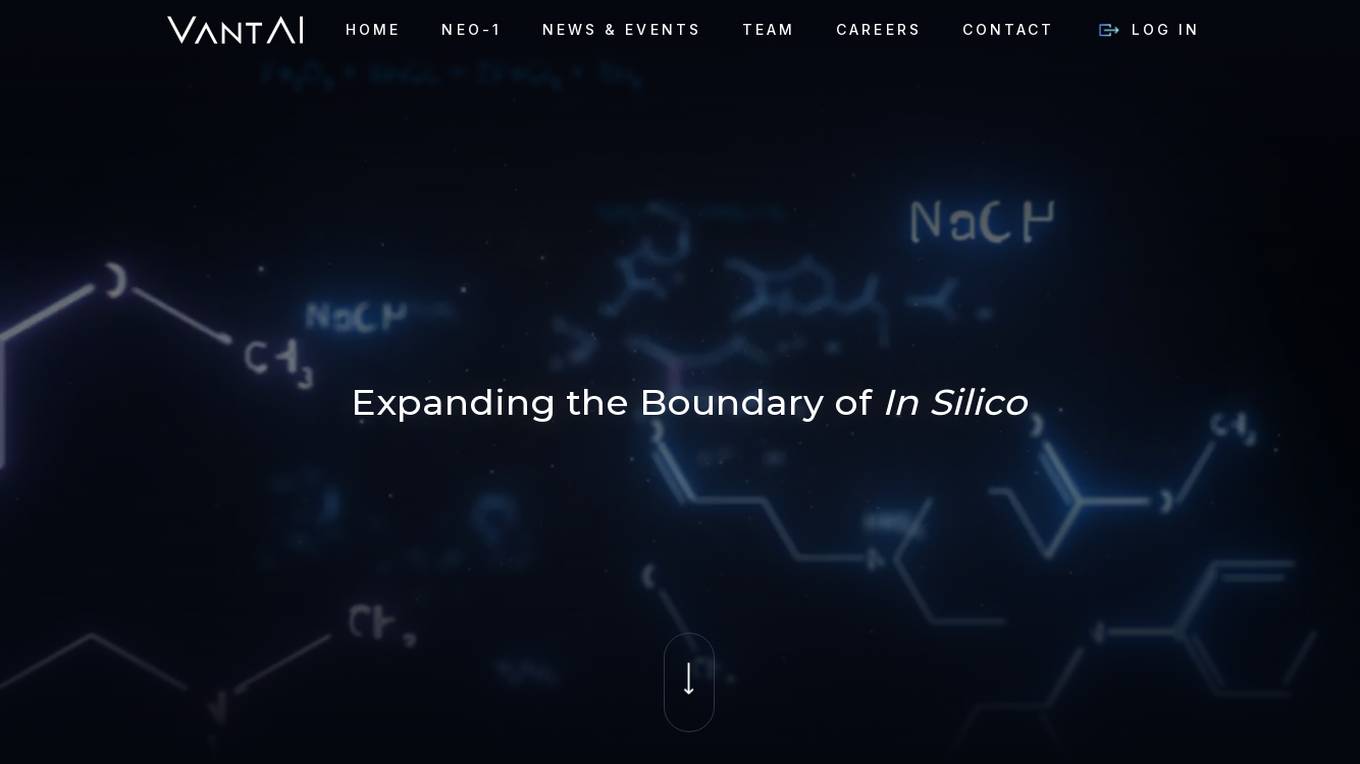
VantAI
VantAI is an AI application focused on generative AI-enabled drug discovery. Their mission is to unlock a new chapter in medicine by making protein interactions programmable. They have an integrated discovery platform with phase-shifting technologies designed to unlock the full potential of the proximity modulator modality. VantAI collaborates with industry leaders to build the future of therapeutic design. The company has launched Neo-1, the first AI model to rewire molecular interactions by unifying structure prediction and generation.

Allchemy
Allchemy is a resource-aware AI platform for drug discovery. It combines state-of-the-art computational synthesis with AI algorithms to predict molecular properties. Within minutes, Allchemy creates thousands of synthesizable lead candidates meeting user-defined profiles of drug-likeness, affinity towards specific proteins, toxicity, and a range of other physical-chemical measures. Allchemy encompasses the entire resource-to-drug design process and has been used in academic, corporate and classified environments worldwide to: Design synthesizable leads targeting specific proteins Evolve scaffolds similar to desired drugs Design “circular” drug syntheses from renewable materials Interface with and instruct automated synthesis platforms and optimize pilot-scale processes Operate “iterative synthesis” schemes Predict side reactions and create forensic “synthetic signatures” of hazardous/toxic molecules Design synthetic degradation and recovery cycles for various types of feedstocks and functional target molecules
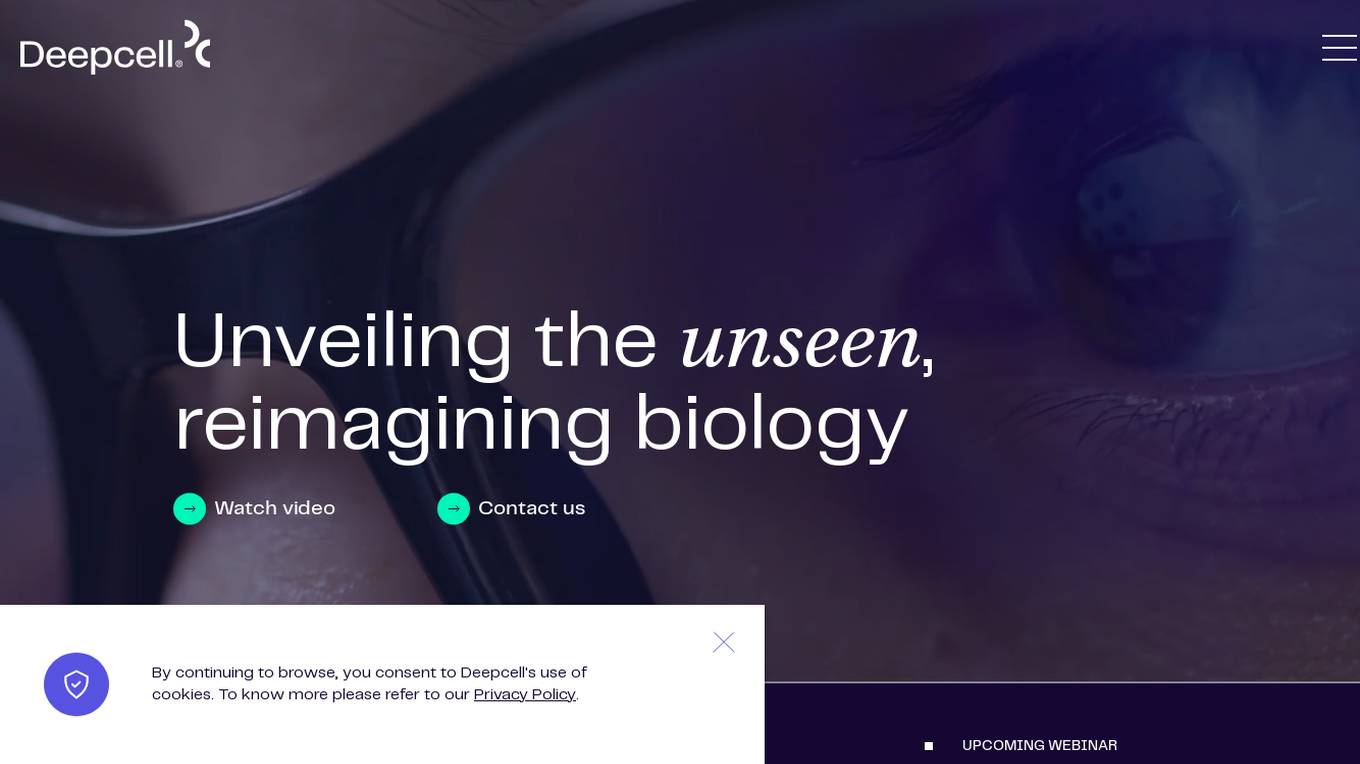
Deepcell
Deepcell is a company that develops technology for single-cell analysis. Their REM-I platform combines label-free imaging, deep learning, and gentle sorting to leverage single cell morphology as a high-dimensional quantitative readout. This allows researchers to gain insights into cells' phenotype and function to address important research questions across biology.

HUAWEI Cloud Pangu Drug Molecule Model
HUAWEI Cloud Pangu is an AI tool designed for accelerating drug discovery by optimizing drug molecules. It offers features such as Molecule Search, Molecule Optimizer, and Pocket Molecule Design. Users can submit molecules for optimization and view historical optimization results. The tool is based on the MindSpore framework and has been visited over 300,000 times since August 23, 2021.
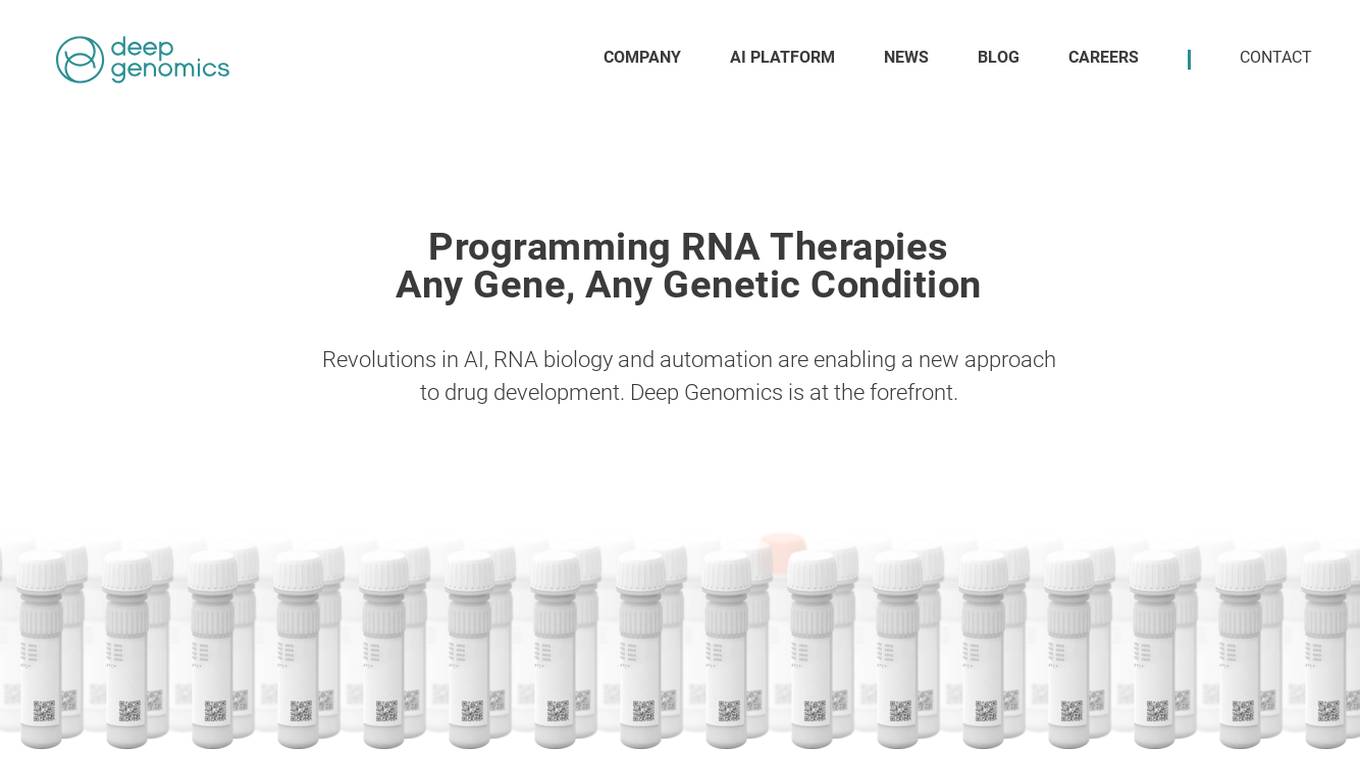
Deep Genomics
Deep Genomics is a company that uses artificial intelligence (AI) to develop RNA therapies for genetic diseases. The company's AI platform is designed to identify novel targets and evaluate thousands of possibilities to identify the best therapeutic candidates. Deep Genomics is currently developing BigRNA+, which will expand the number of mechanisms and genetic variants the company can pursue.
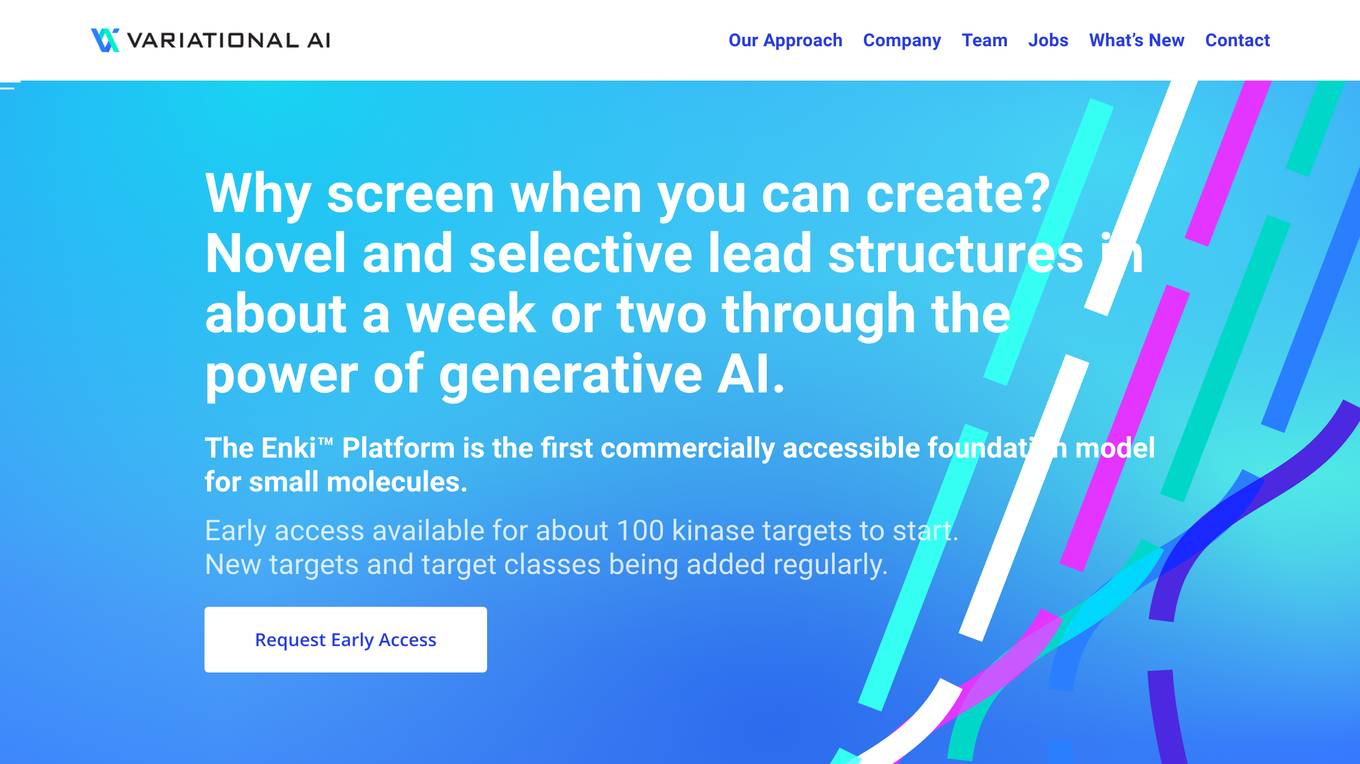
Variational AI
Variational AI is a company that uses generative AI to discover novel drug-like small molecules with optimized properties for defined targets. Their platform, Enki™, is the first commercially accessible foundation model for small molecules. It is designed to make generating novel molecule structures easy, with no data required. Users simply define their target product profile (TPP) and Enki does the rest. Enki is an ensemble of generative algorithms trained on decades worth of experimental data with proven results. The company was founded in September 2019 and is based in Vancouver, BC, Canada.
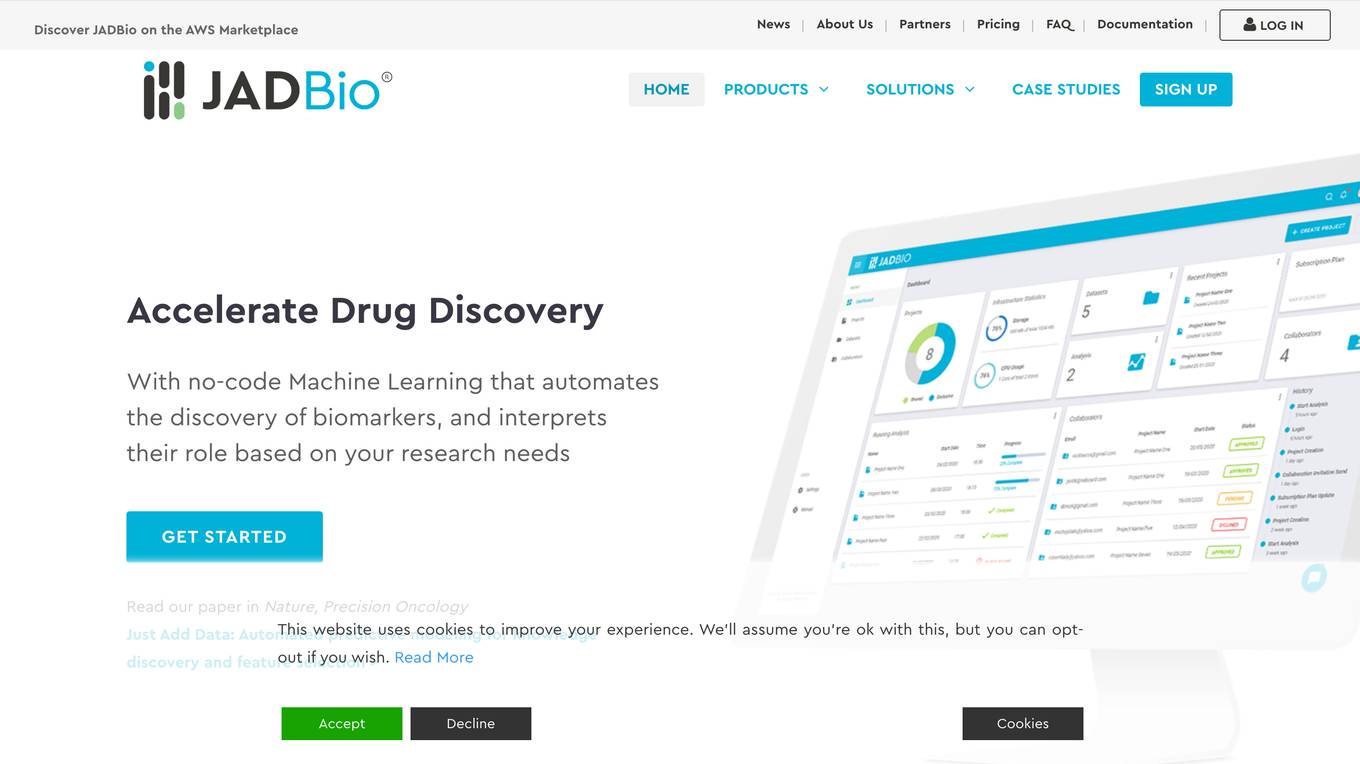
JADBio
JADBio is an automated machine learning (AutoML) platform designed to accelerate biomarker discovery and drug development processes. It offers a no-code solution that automates the discovery of biomarkers and interprets their role based on research needs. JADBio can parse multi-omics data, including genomics, transcriptome, metagenome, proteome, metabolome, phenotype/clinical data, and images, enabling users to efficiently discover insights for various conditions such as cancer, immune system disorders, chronic diseases, infectious diseases, and mental health. The platform is trusted by partners in precision health and medicine and is continuously evolving to disrupt drug discovery times and costs at all stages.
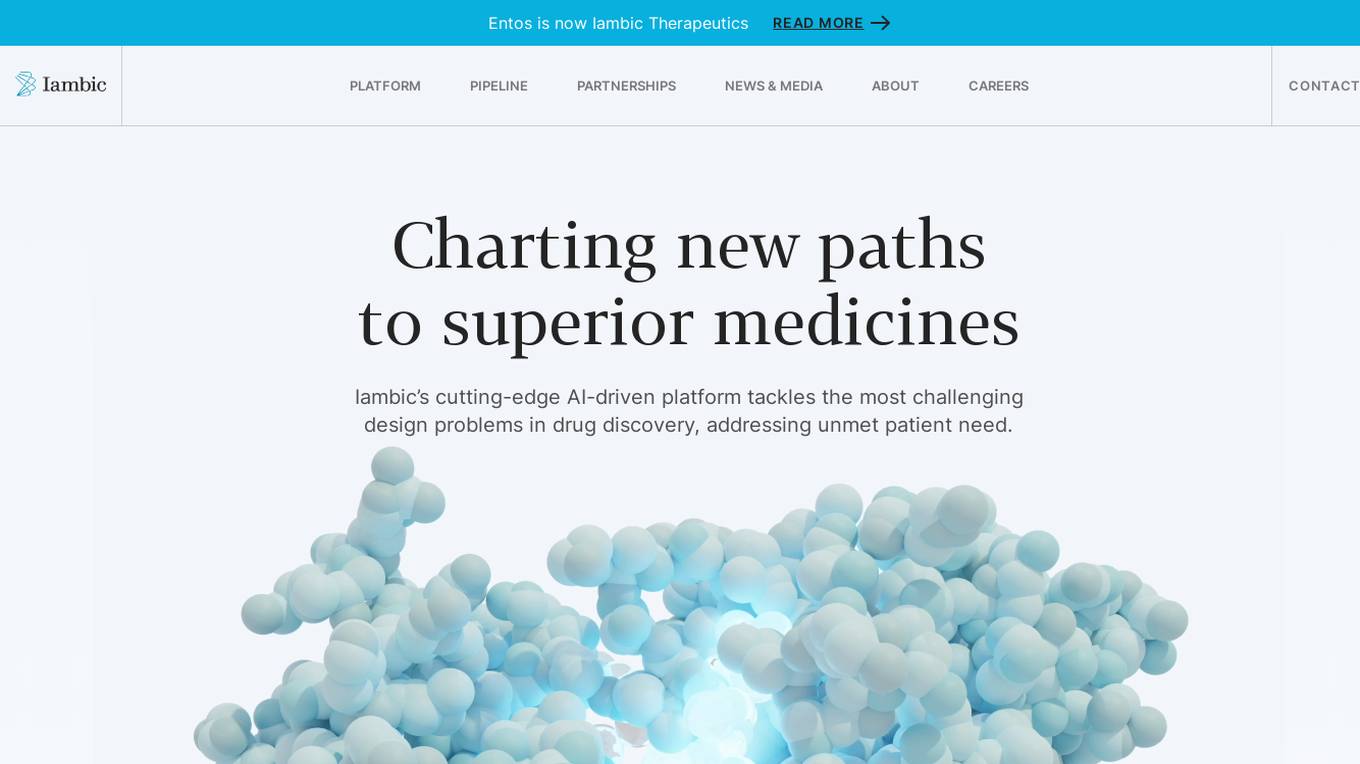
Iambic Therapeutics
Iambic Therapeutics is a cutting-edge AI-driven drug discovery platform that tackles the most challenging design problems in drug discovery, addressing unmet patient need. Its physics-based AI algorithms drive a high-throughput experimental platform, converting new molecular designs to new biological insights each week. Iambic's platform optimizes target product profiles, exploring multiple profiles in parallel to ensure that molecules are designed to solve the right problems in disease biology. It also optimizes drug candidates, deeply exploring chemical space to reveal novel mechanisms of action and deliver diverse high-quality leads.
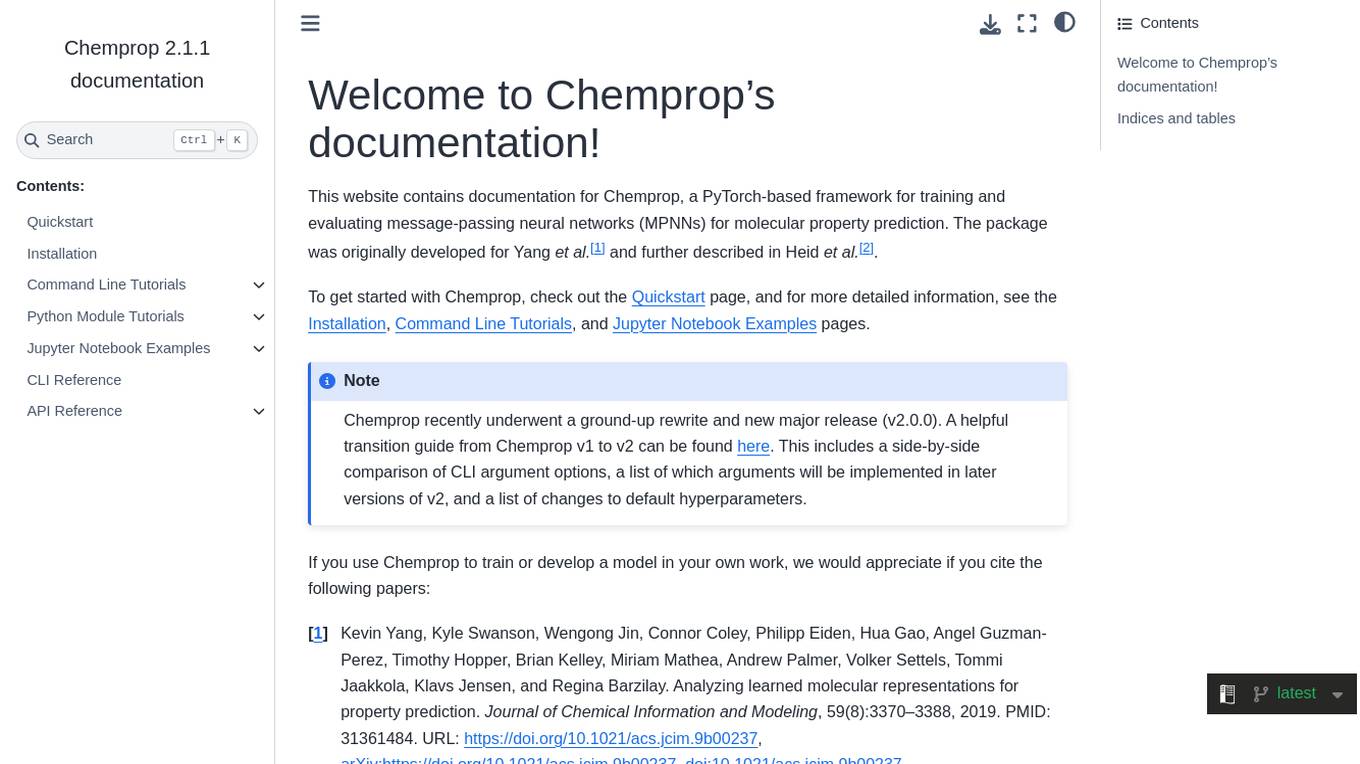
Chemprop
Chemprop is a PyTorch-based framework for training and evaluating message-passing neural networks (MPNNs) for molecular property prediction. Originally developed for research purposes, Chemprop offers a comprehensive set of tools and features for training models and analyzing molecular representations. The package underwent a recent major release (v2.0.0) with significant improvements and updates.
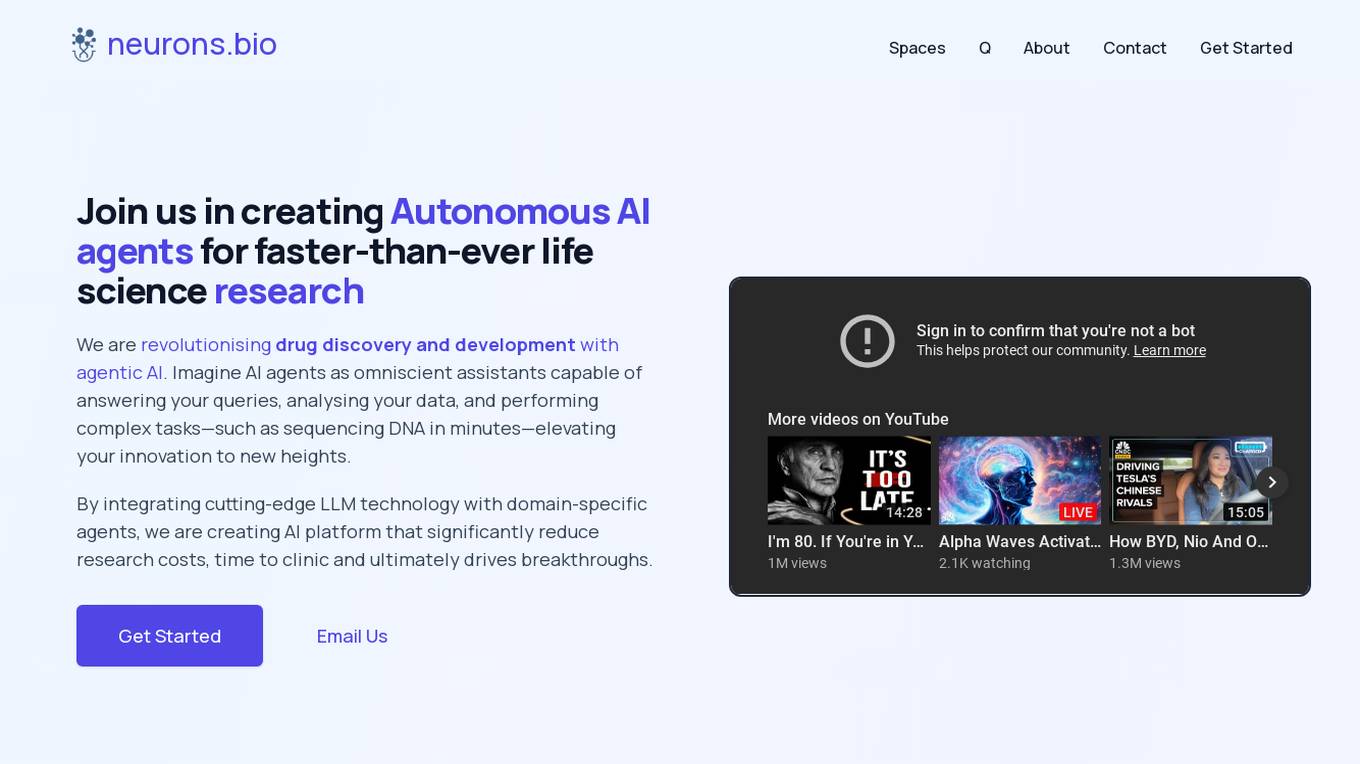
neurons.bio
neurons.bio is an AI application that offers a unique collection of over 100 AI agents designed for drug development, medicine, and life science research. These agents perform specific tasks efficiently, retrieve data from various sources, and provide insights to accelerate research processes. The platform aims to revolutionize drug discovery and development by integrating cutting-edge LLM technology with domain-specific agents, reducing research costs and time to clinic.
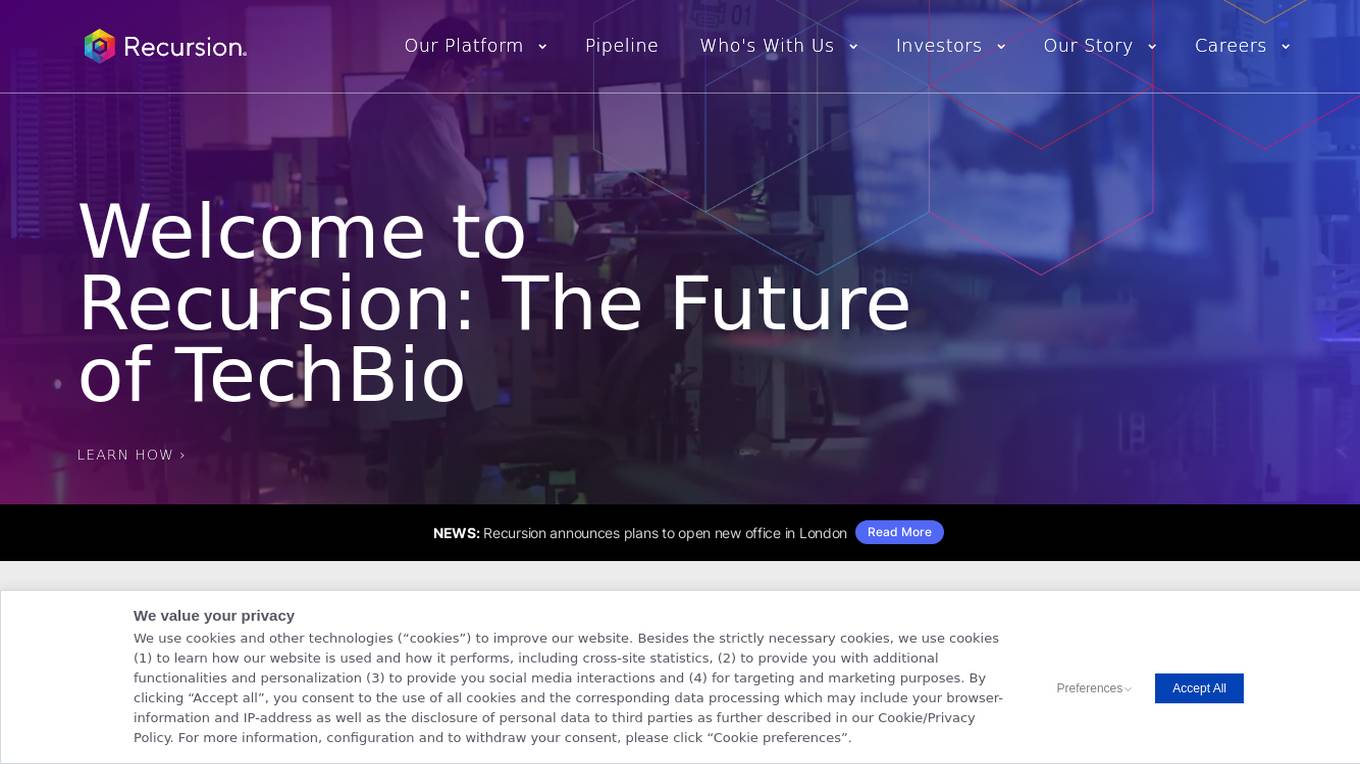
Recursion
Recursion is a techbio company that uses artificial intelligence to accelerate drug discovery. The company's platform combines hardware, software, and data to create a more efficient and effective drug discovery process. Recursion has a broad pipeline of drug candidates in development, and it has partnered with several leading pharmaceutical companies. The company is headquartered in Salt Lake City, Utah.
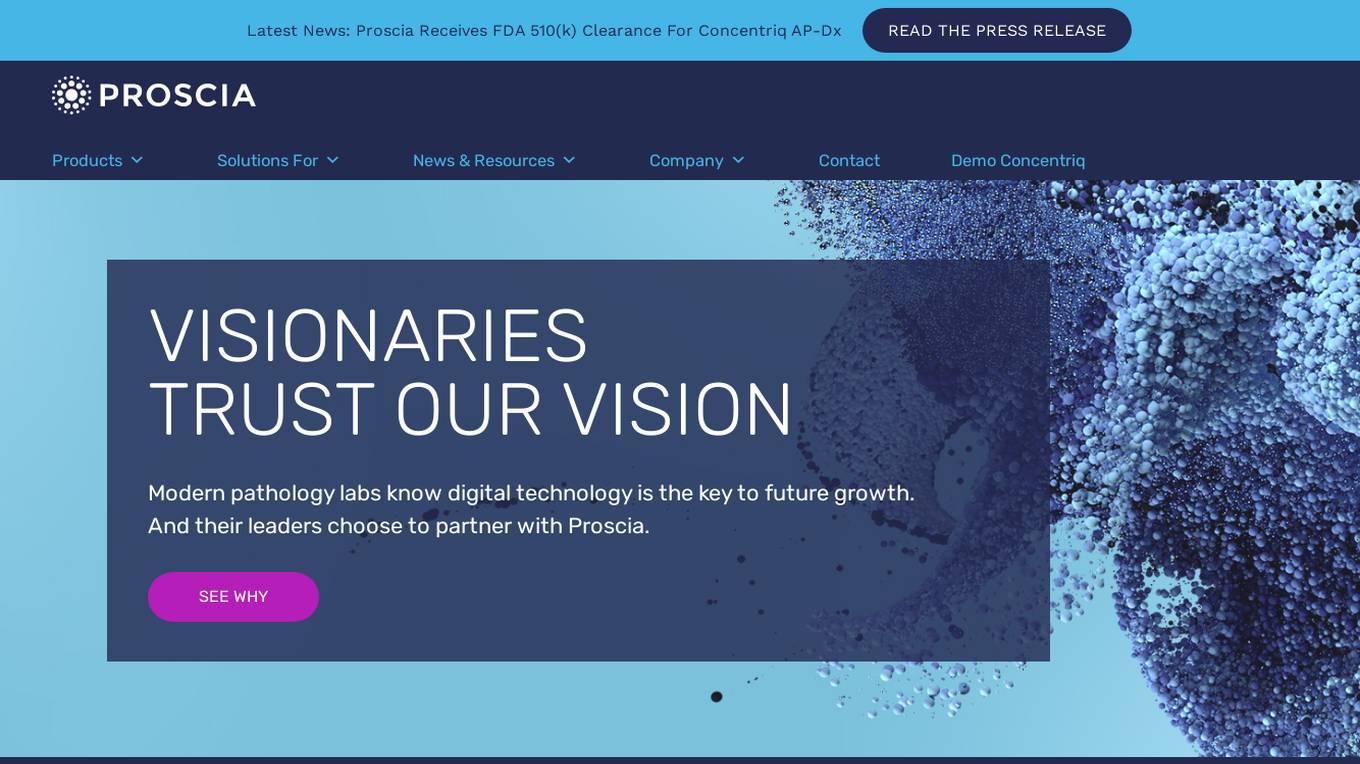
Proscia
Proscia is a leading provider of digital pathology solutions for the modern laboratory. Its flagship product, Concentriq, is an enterprise pathology platform that enables anatomic pathology laboratories to achieve 100% digitization and deliver faster, more precise results. Proscia also offers a range of AI applications that can be used to automate tasks, improve diagnostic accuracy, and accelerate research. The company's mission is to perfect cancer diagnosis with intelligent software that changes the way the world practices pathology.

XtalPi
XtalPi is a world-leading technology company driven by artificial intelligence (AI) and robotics to innovate in the fields of life sciences and new materials. Founded in 2015 at the Massachusetts Institute of Technology (MIT), the company is committed to realizing digital and intelligent innovation in the fields of life sciences and new materials. Based on cutting-edge technologies and capabilities such as quantum physics, artificial intelligence, cloud computing, and large-scale experimental robot clusters, the company provides innovative technologies, services, and products for global industries such as biomedicine, chemicals, new energy, and new materials.
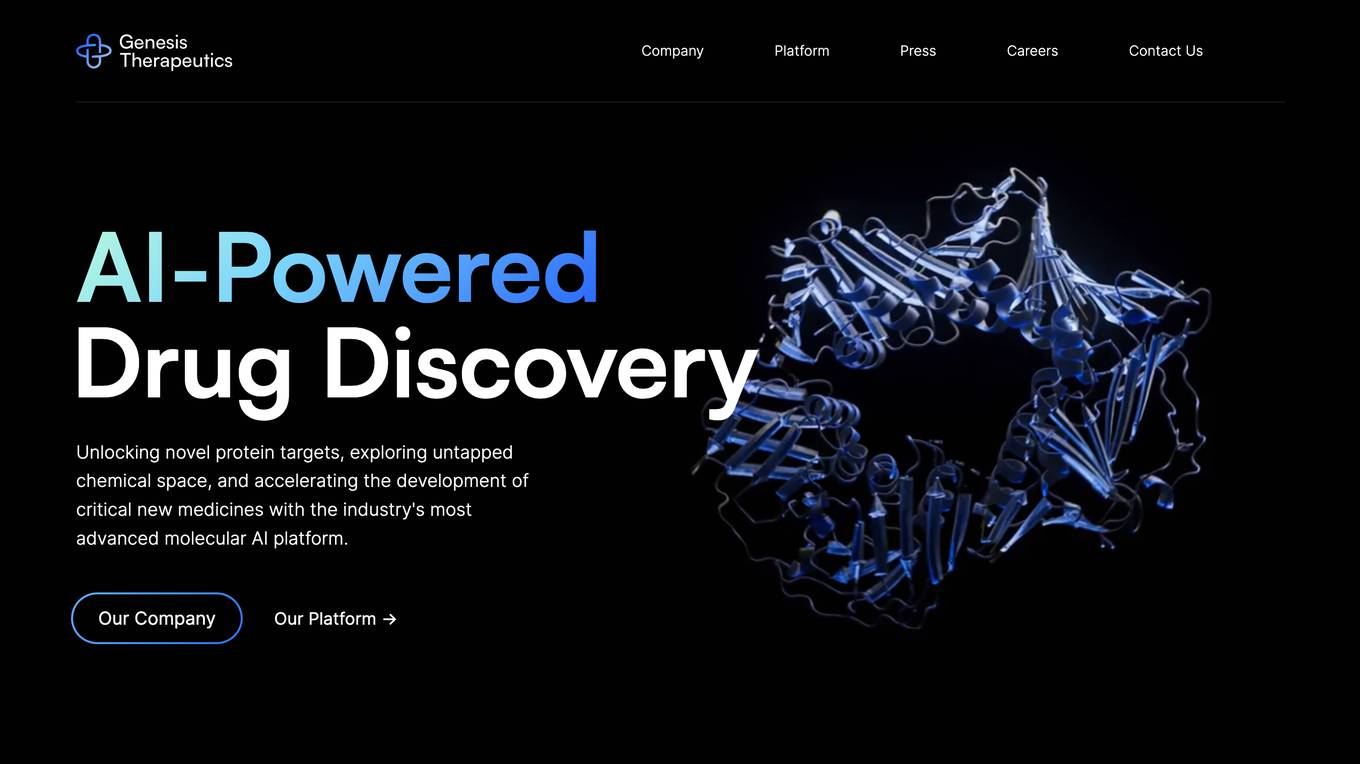
Genesis Molecular AI
Genesis Molecular AI is a pioneering molecular AI platform that builds and deploys GEMS, the AI Operating System for drug discovery. Their platform, including the model Pearl, empowers scientists to unlock tough protein targets and invent medicines with unprecedented potency and selectivity. Genesis combines AI and physics research to create a state-of-the-art platform for drug discovery, providing highly potent and selective drugs to address chemically complex targets. The company's success is attributed to a collaborative mix of minds across AI and biotech, working in iterative, interdisciplinary loops to discover and develop drugs for challenging targets.
For similar tasks

Cradle
Cradle is a protein engineering platform that uses machine learning to design improved protein sequences. It allows users to import assay data, generate new sequences, test them in the lab, and import the results to improve the model. Cradle can be used to optimize multiple properties of a protein simultaneously, and it has been used by leading biotech teams to accelerate new and ongoing projects.
For similar jobs

Cradle
Cradle is a protein engineering platform that uses machine learning to design improved protein sequences. It allows users to import assay data, generate new sequences, test them in the lab, and import the results to improve the model. Cradle can be used to optimize multiple properties of a protein simultaneously, and it has been used by leading biotech teams to accelerate new and ongoing projects.

JADBio
JADBio is an automated machine learning (AutoML) platform designed to accelerate biomarker discovery and drug development processes. It offers a no-code solution that automates the discovery of biomarkers and interprets their role based on research needs. JADBio can parse multi-omics data, including genomics, transcriptome, metagenome, proteome, metabolome, phenotype/clinical data, and images, enabling users to efficiently discover insights for various conditions such as cancer, immune system disorders, chronic diseases, infectious diseases, and mental health. The platform is trusted by partners in precision health and medicine and is continuously evolving to disrupt drug discovery times and costs at all stages.
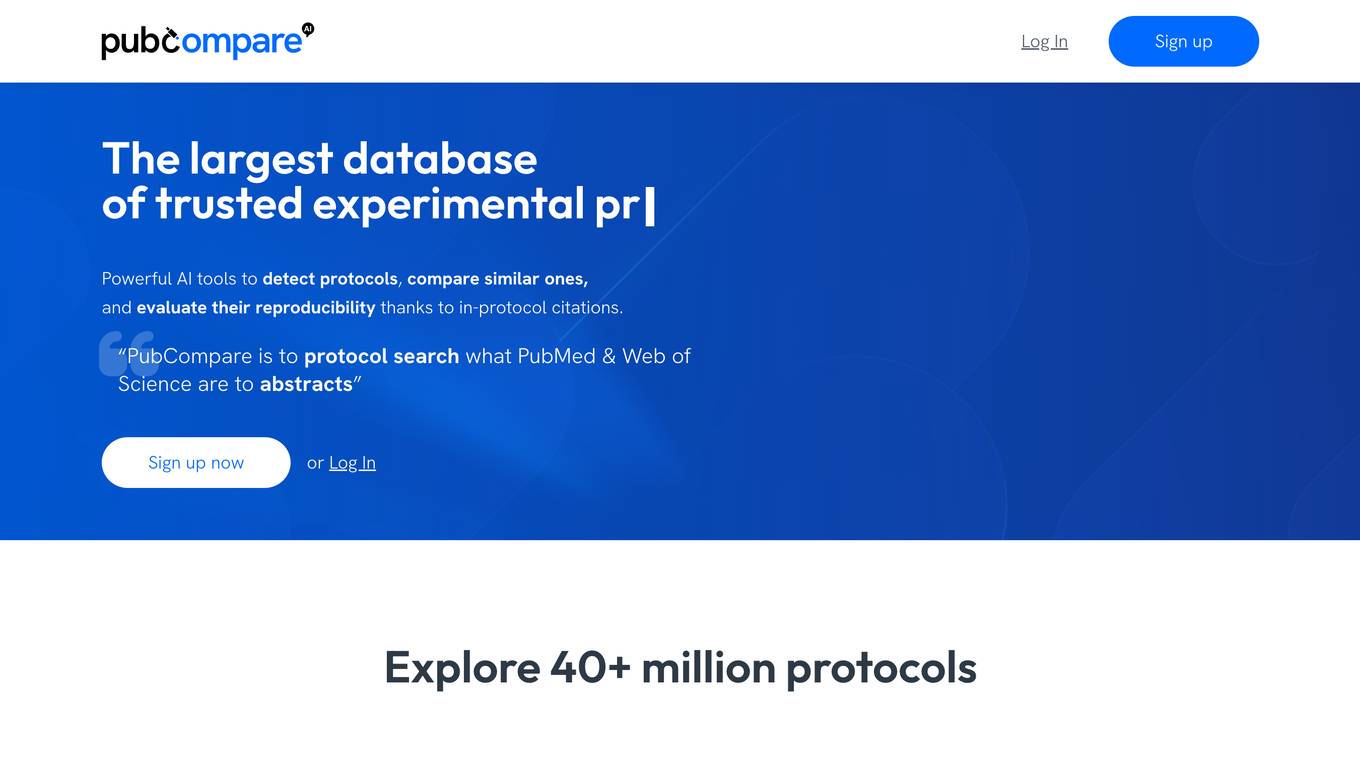
PubCompare
PubCompare is a powerful AI-powered tool that helps scientists search, compare, and evaluate experimental protocols. With over 40 million protocols in its database, PubCompare is the largest repository of trusted experimental protocols. PubCompare's AI-powered search features allow users to find similar protocols, highlight critical steps, and evaluate the reproducibility of protocols based on in-protocol citations. PubCompare is available from any computer and requires no download.
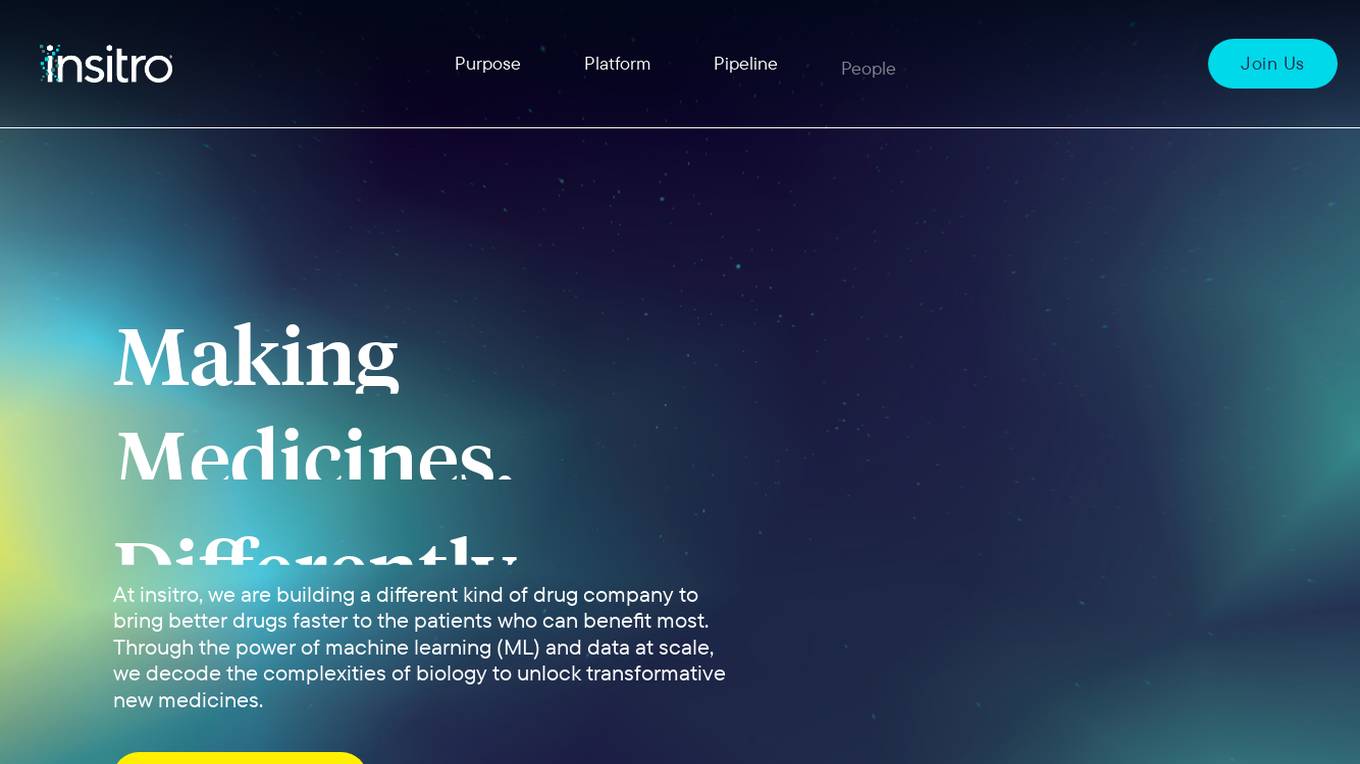
Insitro
Insitro is a drug discovery and development company that uses machine learning and data to identify and develop new medicines. The company's platform integrates in vitro cellular data produced in its labs with human clinical data to help redefine disease. Insitro's pipeline includes wholly-owned and partnered therapeutic programs in metabolism, oncology, and neuroscience.

Deep Genomics
Deep Genomics is a company that uses artificial intelligence (AI) to develop RNA therapies for genetic diseases. The company's AI platform is designed to identify novel targets and evaluate thousands of possibilities to identify the best therapeutic candidates. Deep Genomics is currently developing BigRNA+, which will expand the number of mechanisms and genetic variants the company can pursue.
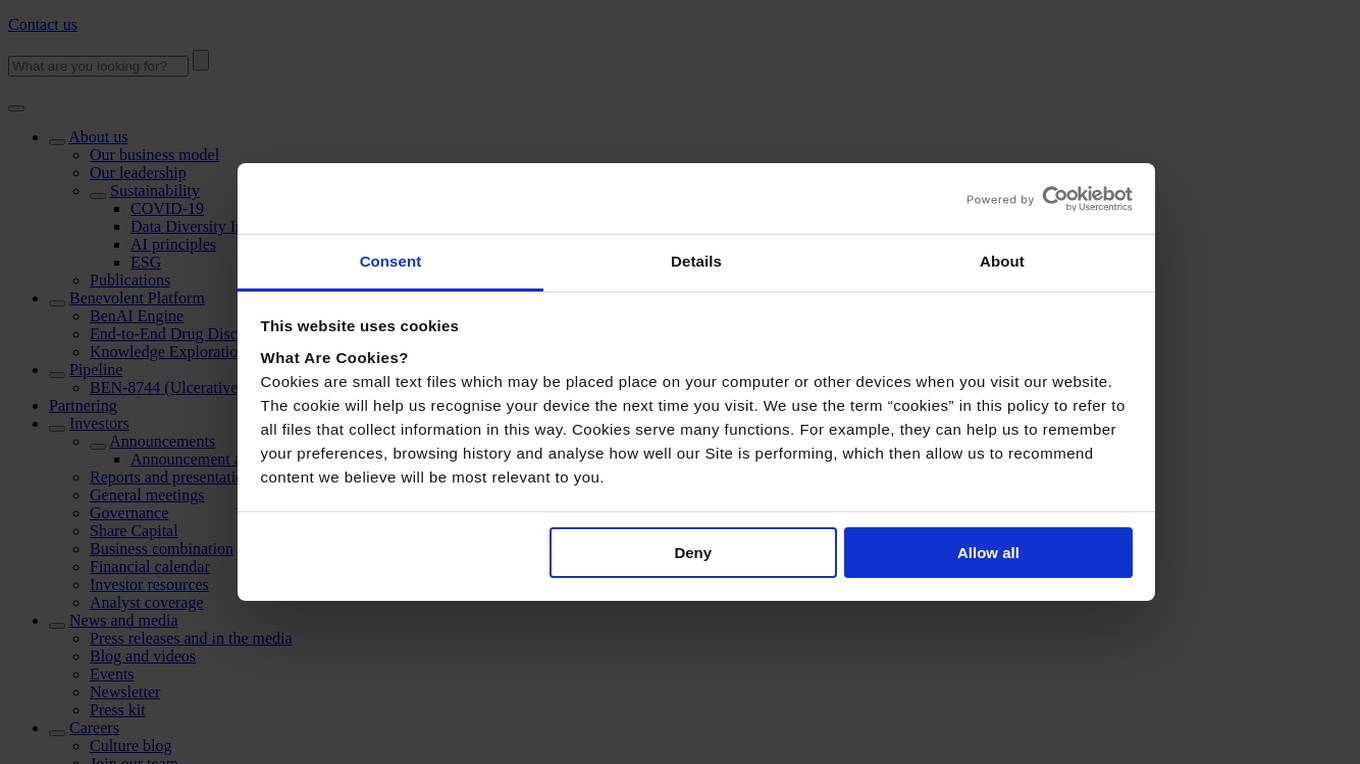
BenevolentAI
BenevolentAI is a leader in applying advanced AI to accelerate biopharma drug discovery blending science and technology with a focus on finding solutions for complex diseases. We empower both biopharmaceutical companies and our internal scientists to harness the full potential of data and AI to accelerate the next generation of scientific advances. We have built our AI-enabled drug discovery engine to drive a revolution in drug discovery. The Benevolent Platform™ unlocks the power of a vast biomedical data landscape to provide a multidimensional representation of human biology across all diseases. We believe this approach will improve the probability of clinical success, and help us deliver life-changing treatments to patients – because it matters.

XtalPi
XtalPi is a world-leading technology company driven by artificial intelligence (AI) and robotics to innovate in the fields of life sciences and new materials. Founded in 2015 at the Massachusetts Institute of Technology (MIT), the company is committed to realizing digital and intelligent innovation in the fields of life sciences and new materials. Based on cutting-edge technologies and capabilities such as quantum physics, artificial intelligence, cloud computing, and large-scale experimental robot clusters, the company provides innovative technologies, services, and products for global industries such as biomedicine, chemicals, new energy, and new materials.

Iambic Therapeutics
Iambic Therapeutics is a cutting-edge AI-driven drug discovery platform that tackles the most challenging design problems in drug discovery, addressing unmet patient need. Its physics-based AI algorithms drive a high-throughput experimental platform, converting new molecular designs to new biological insights each week. Iambic's platform optimizes target product profiles, exploring multiple profiles in parallel to ensure that molecules are designed to solve the right problems in disease biology. It also optimizes drug candidates, deeply exploring chemical space to reveal novel mechanisms of action and deliver diverse high-quality leads.
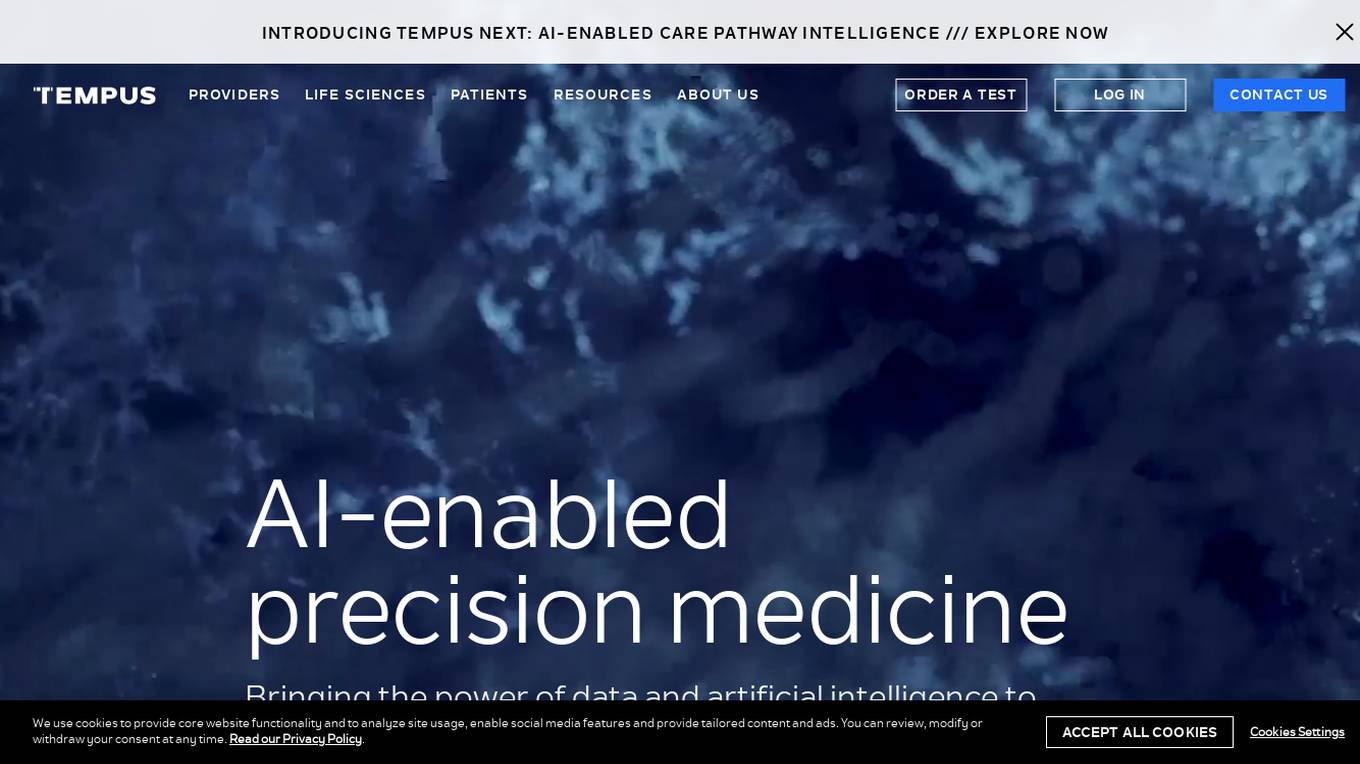
Tempus
Tempus is an AI-enabled precision medicine company that brings the power of data and artificial intelligence to healthcare. With the power of AI, Tempus accelerates the discovery of novel targets, predicts the effectiveness of treatments, identifies potentially life-saving clinical trials, and diagnoses multiple diseases earlier. Tempus' innovative technology includes ONE, an AI-enabled clinical assistant; NEXT, which identifies and closes gaps in care; LENS, which finds, accesses, and analyzes multimodal real-world data; and ALGOS, algorithmic models connected to Tempus' assays to provide additional insight.
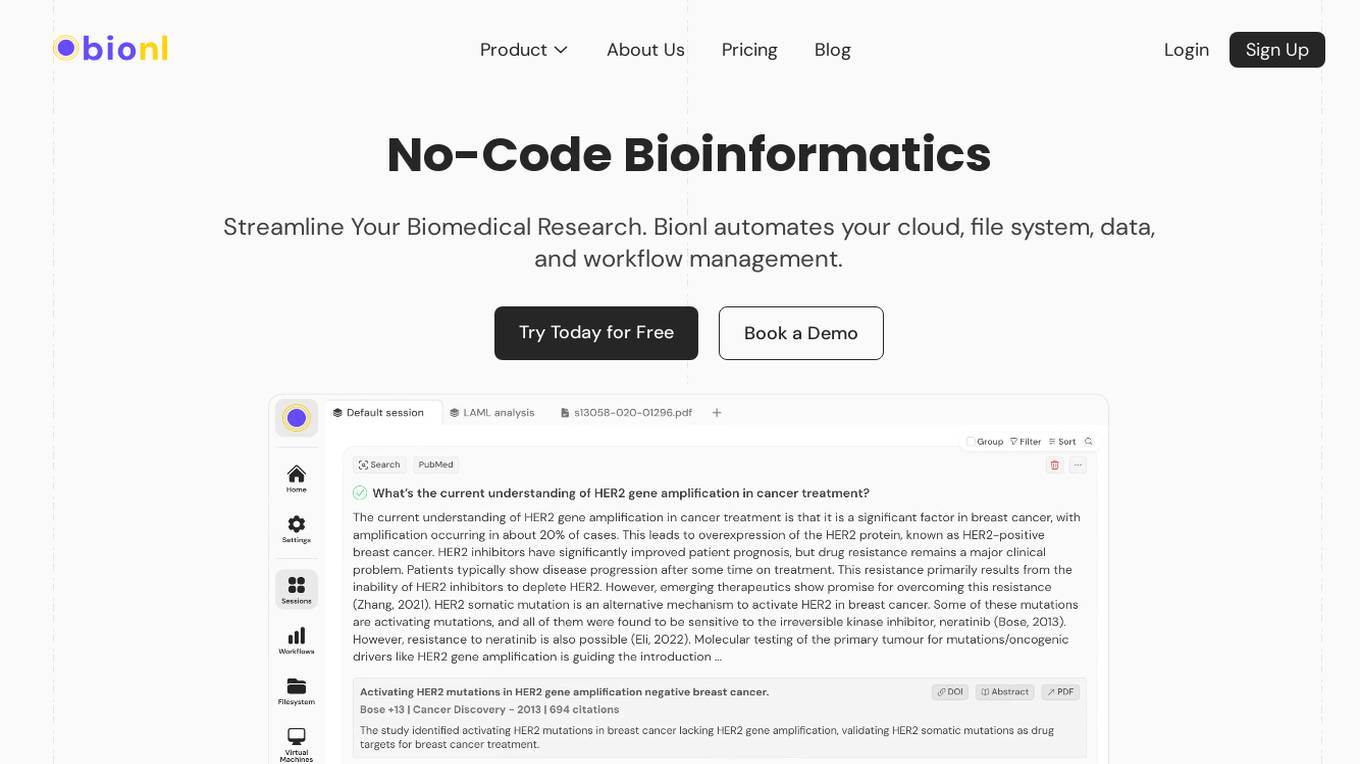
Bionl
Bionl is a no-code bioinformatics platform designed to streamline biomedical research for researchers and scientists. It offers a full workspace with features such as bioinformatics pipelines customization, GenAI for data analysis, AI-powered literature search, PDF analysis, and access to public datasets. Bionl aims to automate cloud, file system, data, and workflow management for efficient and precise analyses. The platform caters to Pharma and Biotech companies, academic researchers, and bioinformatics CROs, providing powerful tools for genetic analysis and speeding up research processes.
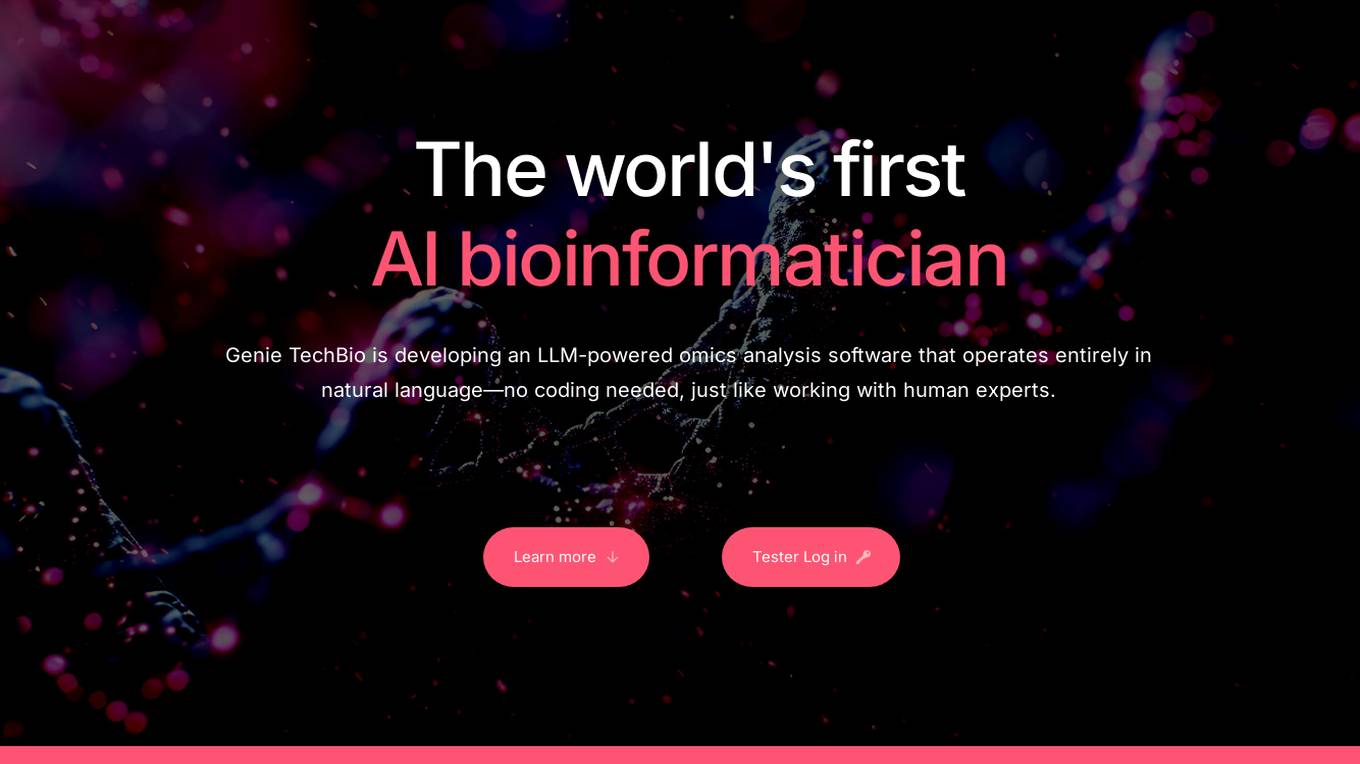
Genie TechBio
Genie TechBio is the world's first AI bioinformatician, offering an LLM-powered omics analysis software that operates entirely in natural language, eliminating the need for coding. Researchers can effortlessly analyze extensive datasets by engaging in a conversation with Genie, receiving recommendations for analysis pipelines, and obtaining results. The tool aims to accelerate biomedical research and empower scientists with newfound data analysis capabilities.

HoloEye.AI
HoloEye.AI is a transformative AI biological intelligence company that leverages cutting-edge artificial intelligence technology to revolutionize the field of biological research. The platform offers advanced AI solutions for analyzing complex biological data, enabling researchers to gain deeper insights and accelerate scientific discoveries.

Mapmygenome
Mapmygenome is an AI-powered platform that offers DNA testing products for health, fitness, and beauty. It provides personalized insights based on genetic analysis to help individuals make informed decisions about their health, wellness, and lifestyle choices. With over 23 years of genomics experience and the latest sequencing technology, Mapmygenome aims to empower users to take proactive steps towards improving their overall well-being.

Chemprop
Chemprop is a PyTorch-based framework for training and evaluating message-passing neural networks (MPNNs) for molecular property prediction. Originally developed for research purposes, Chemprop offers a comprehensive set of tools and features for training models and analyzing molecular representations. The package underwent a recent major release (v2.0.0) with significant improvements and updates.
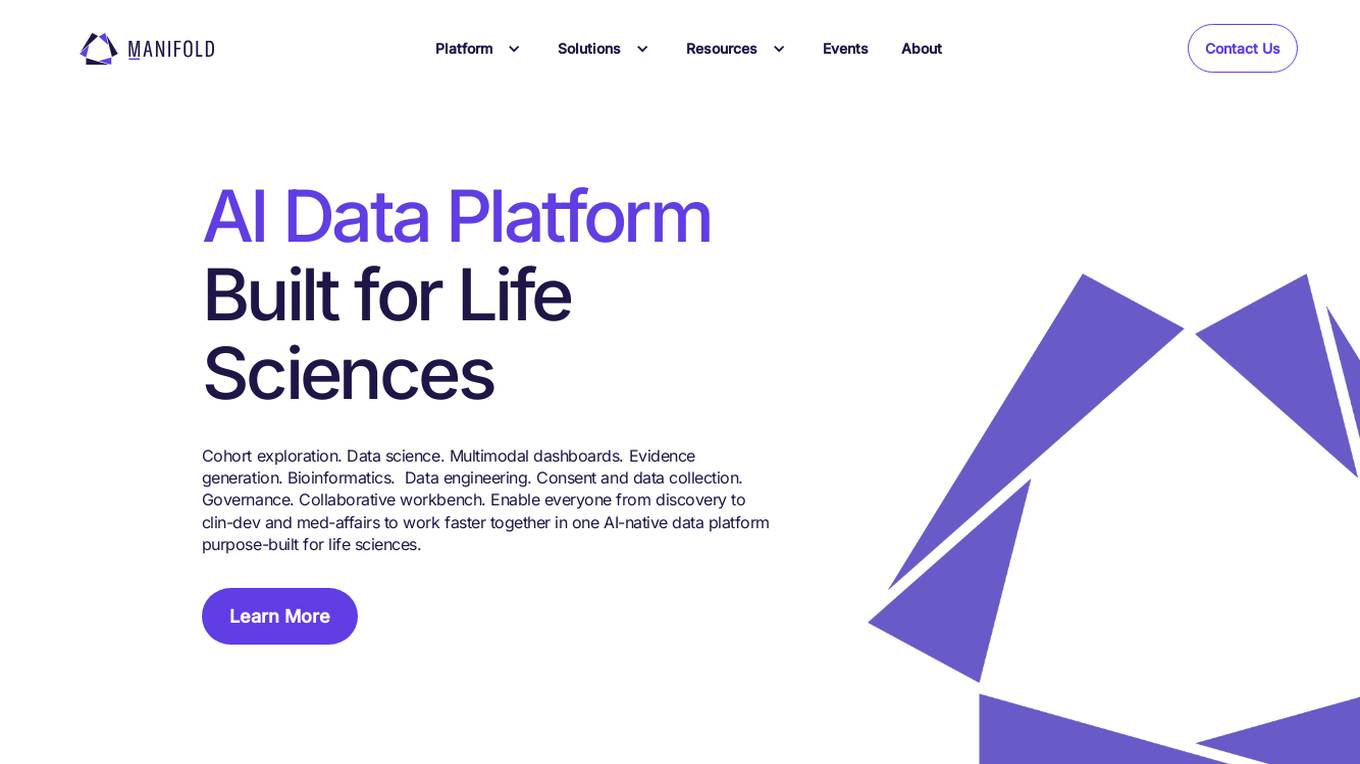
Manifold
Manifold is an AI data platform designed specifically for life sciences. It offers a collaborative workbench, data science tools, AI-powered cohort exploration, batch bioinformatics, data dashboards, data engineering solutions, access control, and more. The platform aims to enable faster collaboration and research in the life sciences field by providing a comprehensive suite of tools and features. Trusted by leading institutions, Manifold helps streamline data collection, analysis, and collaboration to accelerate scientific research.
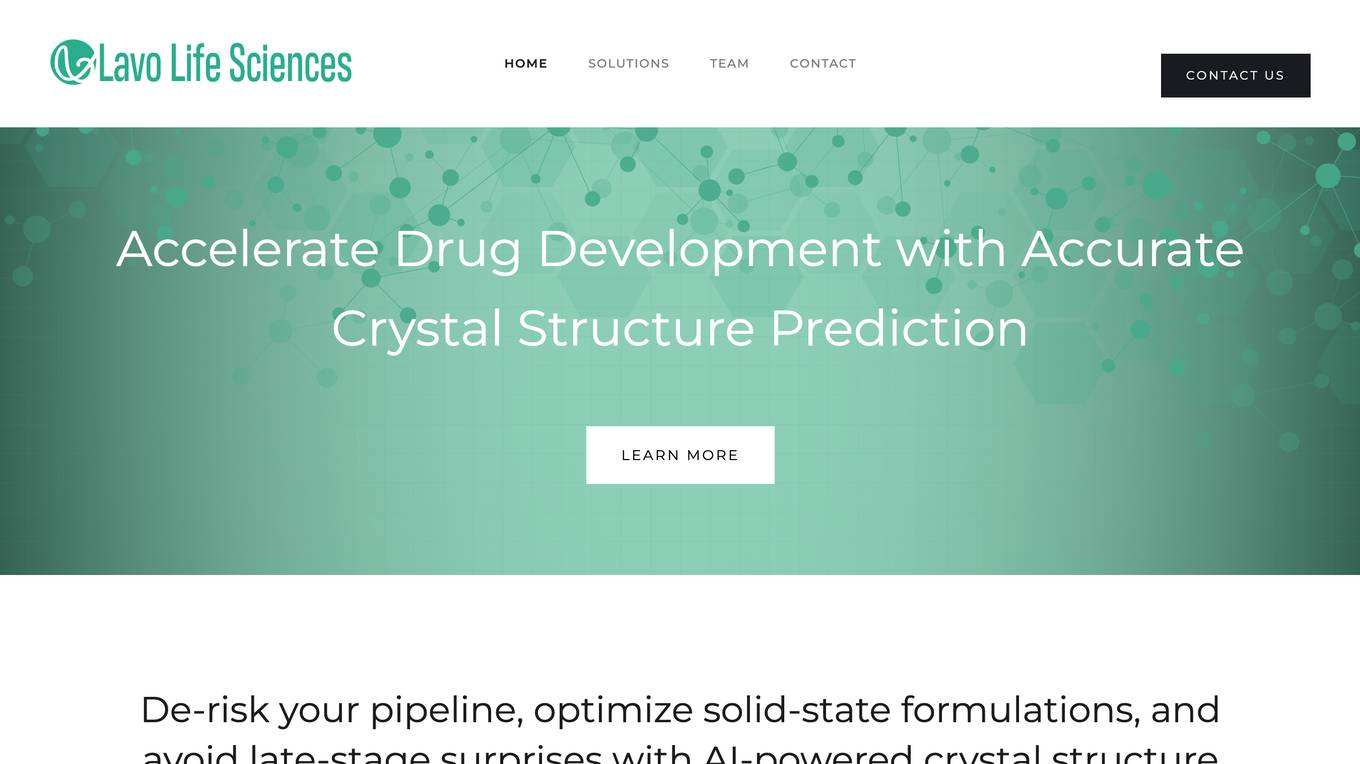
Lavo Life Sciences
Lavo Life Sciences is an AI-accelerated crystal structure prediction application that helps in drug development by providing accurate predictions for small molecule drugs. The application utilizes AI technology to optimize solid-state formulations, reduce turnaround time, mitigate risks, and discover novel polymorphs, ultimately streamlining the pharmaceutical research and development process.
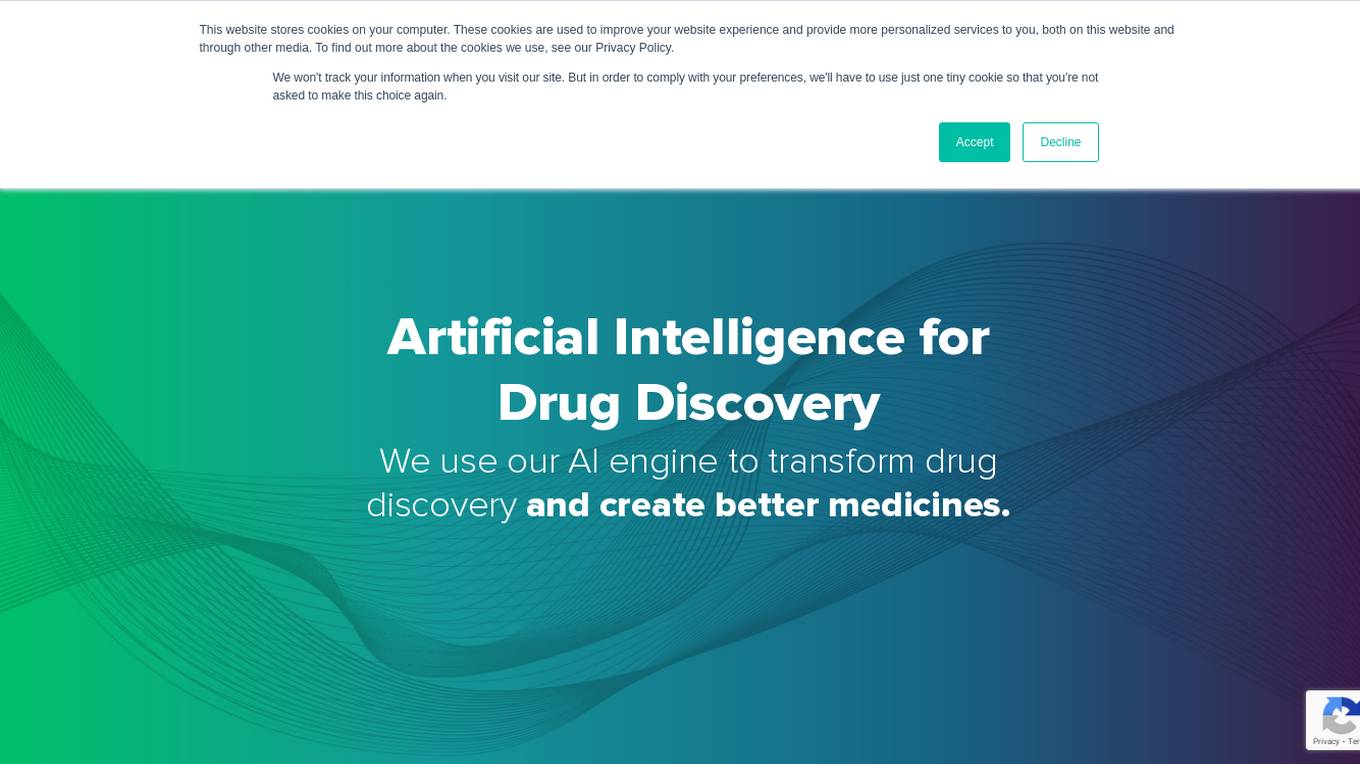
Atomwise
Atomwise is an artificial intelligence (AI)-driven drug discovery company that uses machine learning to discover and develop new small molecule medicines. The company's AI engine combines the power of convolutional neural networks with massive chemical libraries to identify new drug candidates. Atomwise has a wholly owned pipeline of drug discovery programs and also partners with other pharmaceutical companies to co-develop drugs. The company's investors include prominent venture capital firms and pharmaceutical companies.

Recursion
Recursion is a techbio company that uses artificial intelligence to accelerate drug discovery. The company's platform combines hardware, software, and data to create a more efficient and effective drug discovery process. Recursion has a broad pipeline of drug candidates in development, and it has partnered with several leading pharmaceutical companies. The company is headquartered in Salt Lake City, Utah.

Institute for Protein Design
The Institute for Protein Design is a research institute at the University of Washington that uses computational design to create new proteins that solve modern challenges in medicine, technology, and sustainability. The institute's research focuses on developing new protein therapeutics, vaccines, drug delivery systems, biological devices, self-assembling nanomaterials, and bioactive peptides. The institute also has a strong commitment to responsible AI development and has developed a set of principles to guide its use of AI in research.

Allchemy
Allchemy is a resource-aware AI platform for drug discovery. It combines state-of-the-art computational synthesis with AI algorithms to predict molecular properties. Within minutes, Allchemy creates thousands of synthesizable lead candidates meeting user-defined profiles of drug-likeness, affinity towards specific proteins, toxicity, and a range of other physical-chemical measures. Allchemy encompasses the entire resource-to-drug design process and has been used in academic, corporate and classified environments worldwide to: Design synthesizable leads targeting specific proteins Evolve scaffolds similar to desired drugs Design “circular” drug syntheses from renewable materials Interface with and instruct automated synthesis platforms and optimize pilot-scale processes Operate “iterative synthesis” schemes Predict side reactions and create forensic “synthetic signatures” of hazardous/toxic molecules Design synthetic degradation and recovery cycles for various types of feedstocks and functional target molecules
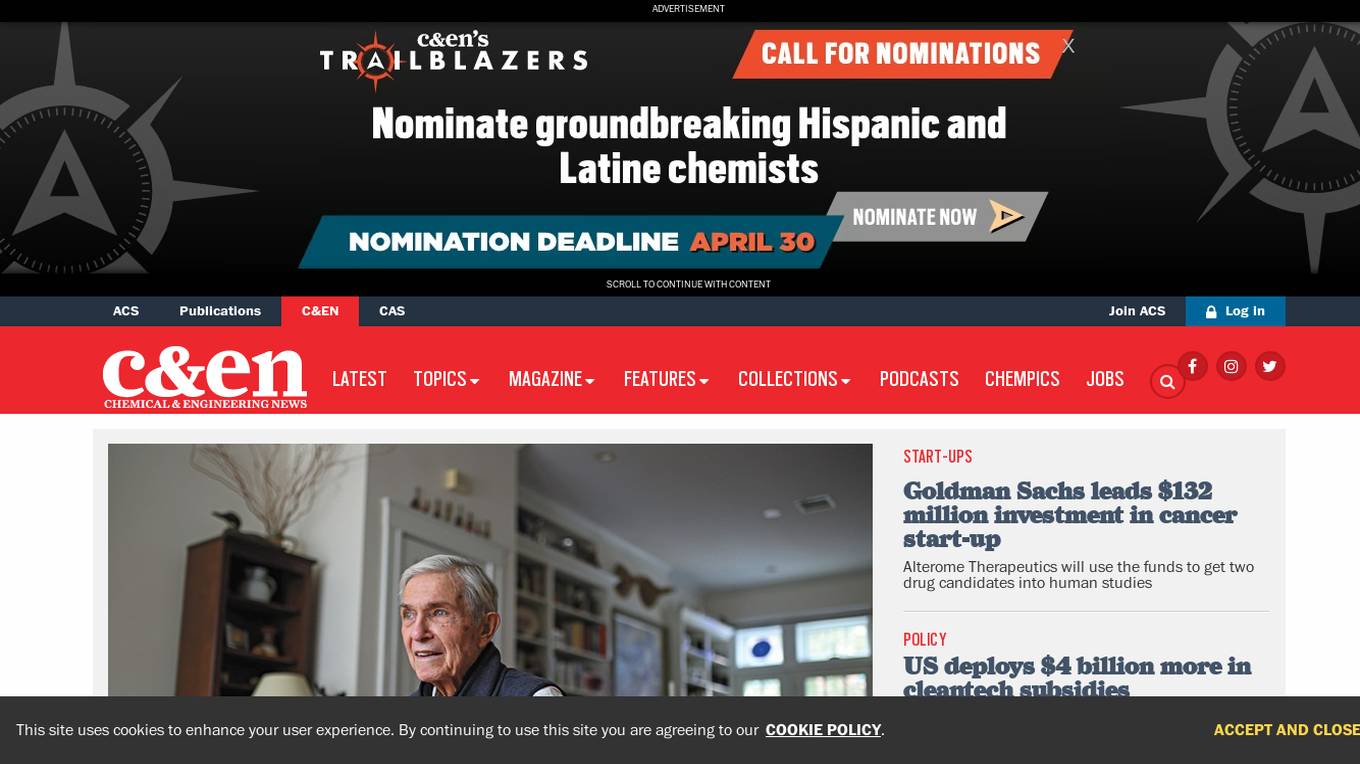
C&EN
C&EN, a publication of the American Chemical Society, provides the latest news and insights on the chemical industry, including research, technology, business, and policy. It covers a wide range of topics, including analytical chemistry, biological chemistry, business, careers, education, energy, environment, food, materials, people, pharmaceuticals, physical chemistry, policy, research integrity, safety, and synthesis.
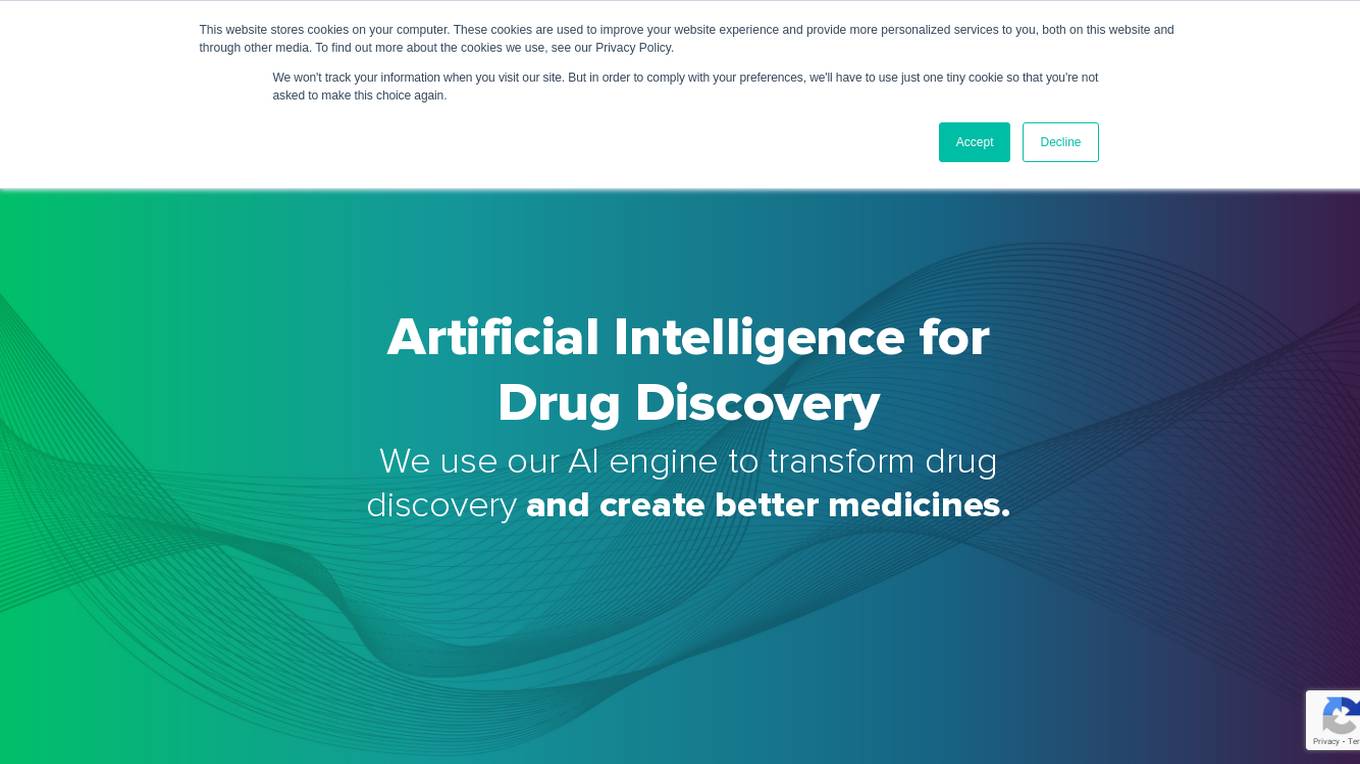
Atomwise
Atomwise is an AI-powered drug discovery company that uses machine learning to identify new small molecule medicines. The company's platform combines the power of convolutional neural networks with massive chemical libraries to discover new drug candidates. Atomwise has a portfolio of wholly owned and co-developed pipeline assets, and is backed by prominent investors.
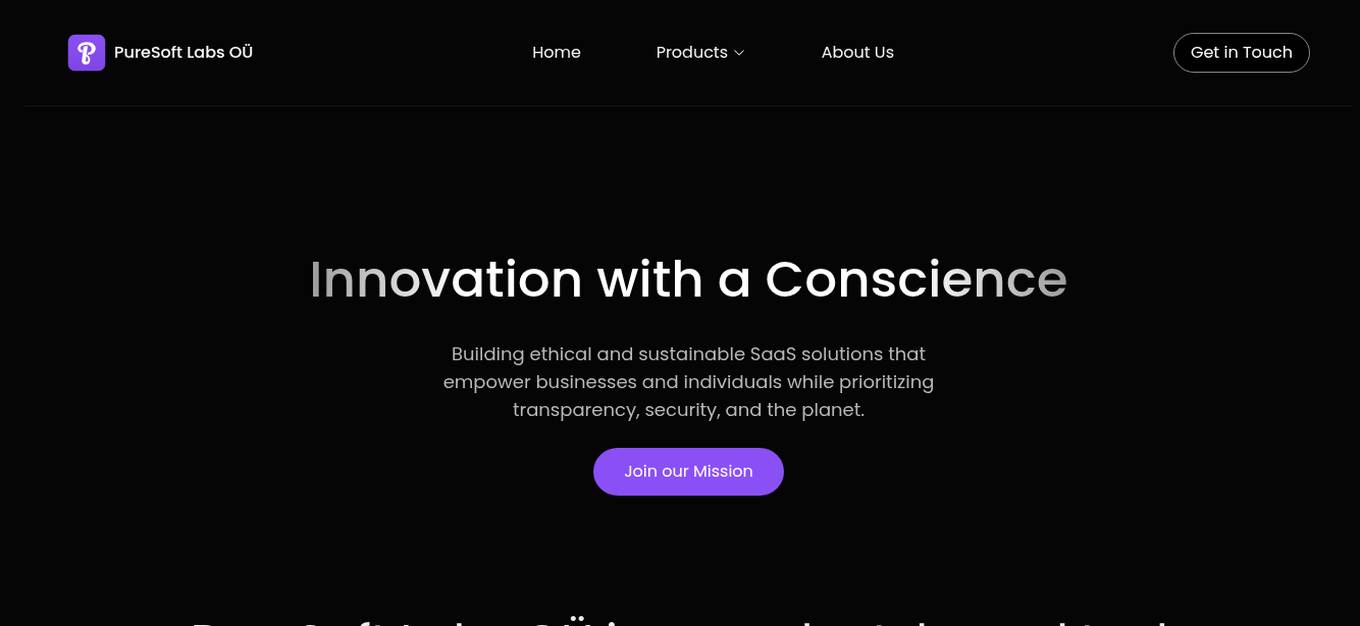
PureSoft Labs OÜ
PureSoft Labs OÜ is a product-based tech startup based in Europe, committed to building B2B and B2C SaaS solutions — both AI-powered and traditional. They focus on responsible, ethical, and sustainable technology that serves its users. The company offers a range of AI-powered products designed to enhance education, mathematics, banking, homework solving, and chemistry assistance. Their products prioritize transparency, security, and performance, aiming to empower businesses and individuals with innovative and responsible technology solutions.
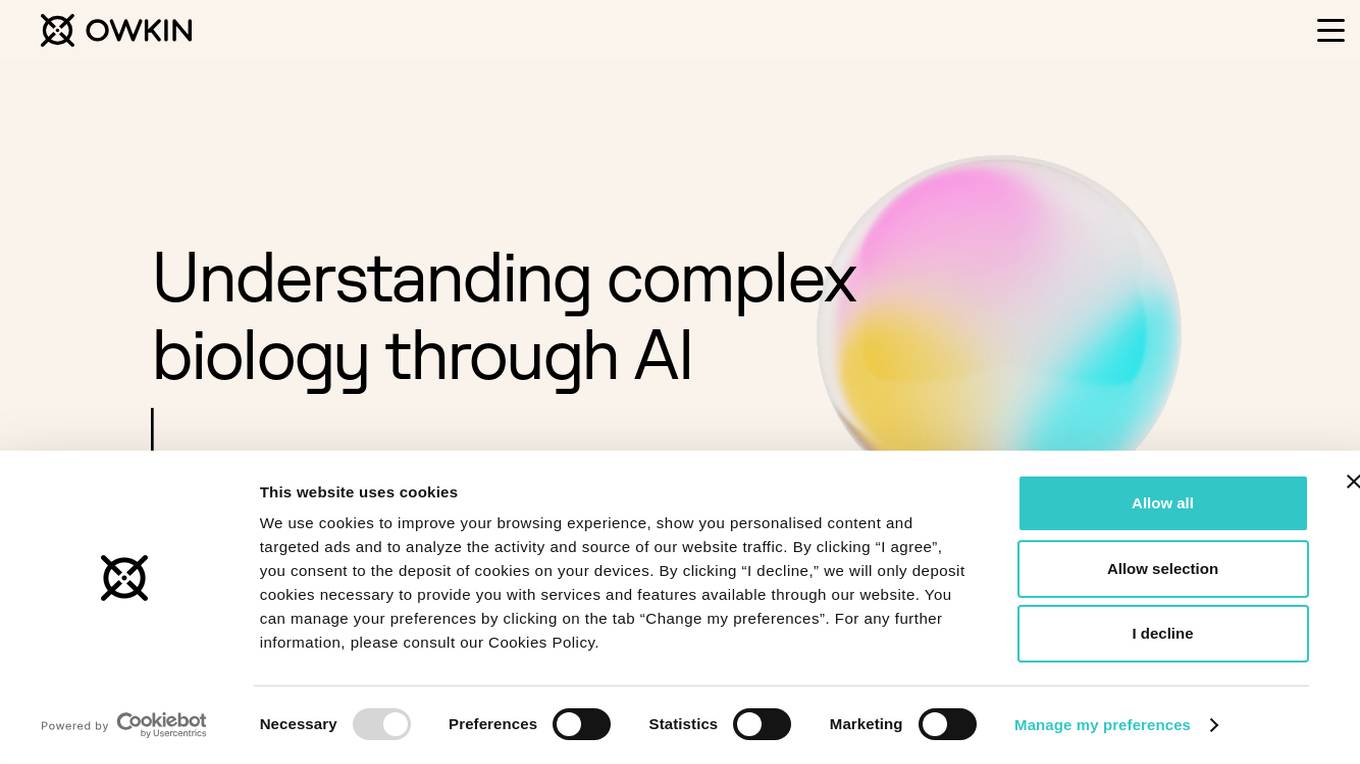
Owkin
Owkin is a full-stack AI biotech company that integrates the best of human and artificial intelligence to deliver better drugs and diagnostics at scale. By understanding complex biology through AI, Owkin identifies new treatments, de-risks and accelerates clinical trials, and builds diagnostic tools to reduce time to impact for patients.